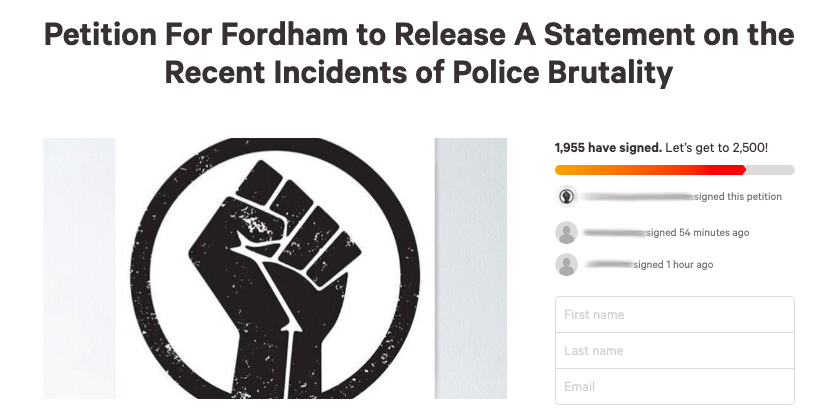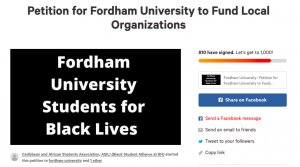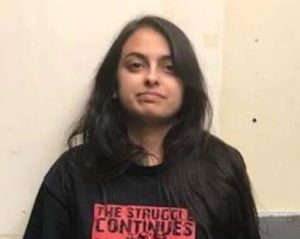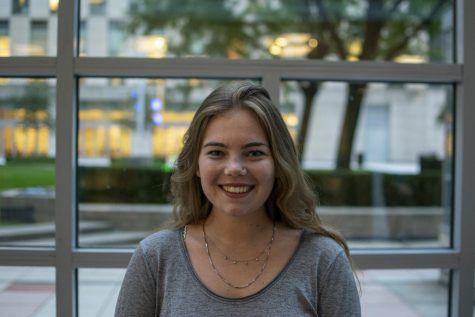University Community Responds to George Floyd’s Death and the Black Lives Matter Movement
CATHERINE MCLAUGHLIN VIA CHANGE.ORG
A Change.org petition circulated on social media after George Floyd’s death, calling for Fordham to release a statement regarding the recent incidents of police brutality. As of May 31, nearly 2,000 signatures had been collected.
June 2, 2020
On May 25, 46-year-old George Floyd was killed by Minneapolis police officers, sparking protests and riots across the United States and around the world in support of Black lives. Floyd’s death followed the recent deaths of Ahmaud Arbery, Breonna Taylor, Nina Pop and Tony McDade, and the same day as a white woman was filmed calling the police on Christian Cooper. The culmination of the events drew attention toward and reignited the Black Lives Matter movement.
Students Start Petition
After Floyd’s death, a petition began circulating on social media calling for Fordham University and President Rev. Joseph M. McShane, S.J., to release an official statement in response. McShane often sends community-wide emails after national events such as terrorist attacks, natural disasters or deaths in the university community.
“If the University really wants to support its student body it must address these incidences and provide support for those who have been affected by these events. It is never right for the University to stay silent on issues of race and injustice,” read the petition.
As of May 31, the petition garnered just under 2,000 signatures. Joseph Waplehorst, Fordham College at Rose Hill (FCRH) ’21, was one student who signed. “In the tradition of the Jesuits, we are Fordham students of all identities and backgrounds, for others,” he wrote in the comment section on the petition.
Protests began in New York City on the evening of May 28 when people gathered in Union Square and throughout Lower Manhattan calling for justice for Floyd and the Black community.
President of ASILI, the Black Student Alliance at Rose Hill, Diontay Santiago, Gabelli School of Business at Rose Hill (GSBRH) ’21, posted an image on his Instagram account that read, “If Fordham is our school and NY is our campus, can we hear about why people are protesting on campus.”
University Response
McShane did issue a statement on the death of George Floyd in a community-wide email on May 30 at approximately 8:45 p.m., which was also posted on Instagram. In his email, McShane referred to former President Barack Obama’s reflections on police brutality and encouraged members of Fordham’s faith-based community to pray for those affected.
“That is not enough. We must do more,” McShane continued. McShane detailed Fordham’s role as a Jesuit university and expressed that “we must recommit ourselves to the work of educating for justice.”
McShane also recognized that conversations about race can be difficult; he explained that the death of innocent people in this country should call members of Fordham to be engaged.
“Let us all look into our hearts and see what justice would look like for the communities of color that are languishing and being crushed under the weight of racism in our country,” McShane wrote.
In response to McShane’s statement, Santiago said that although he wished the university had been able to respond sooner, he is grateful that the statement was eventually issued.
“HOWEVER, as the many enraged comments on the statement’s Instagram post says, there are a lot of vague platitudes and it seems as though the university is tip toe-ing around making a clear stance,” Santiago continued.
One alumnus, Jamie Rodriguez, Fordham College at Lincoln Center (FCLC) ’14, commented on the Instagram post, calling McShane’s response “empty.”
“Many of your security are former NYPD, they harass students of color, especially Black students, when they walk on campus,” Rodriguez wrote in his comment. “I think about the times when protests happened on campus, your security policed us. Your words really don’t mean anything because there is never any action.”
Another student, Daejah Woolery, FCLC ’22, also voiced her disappointment with McShane’s statement and highlighted Fordham’s connection with the NYPD.
“I’m watching your unemployed students donate from depleted accounts and march in the midst of a pandemic and all you have to offer are words? Why aren’t you as brave as the ones who pay for an education from you?”
Students Attend Protests
As protests in the city continue to wane on — Sunday, May 31, marked the fourth night of protests and chaos in New York — NBC News reported that on Saturday alone, the NYPD arrested 435 people with estimations that around 600 people have been arrested in total.
Santiago was one of many who attended a protest in the Bronx on May 30. He said that he chose to go “not just as a Fordham student, but as a Bronxite, an African-American, and human.”
“I was practicing being a man and woman for others by bringing attention to the abuse that people all around the country (and even the world for that matter) have faced at the hand of police,” Santiago continued.
Some of the city’s protests drew in more than 6,000 people, a significantly higher number than Gov. Cuomo and Mayor Bill de Blasio’s social distancing rules, designed to slow the spread of the coronavirus in New York, dictated.
As activists and demonstrators are arrested there has been an outpour of donations to organizations such as the Brooklyn Community Bail Fund, the Liberty Fund in NYC and the National Bail Out Fund.
These bailout funds serve to ensure that protestors are not held in jail simply because they cannot afford bail. Many organizations also list one of their missions as preserving the assumption of innocence until proven guilty.
A group of concerned students have formed another petition now calling on Fordham to donate to New York City’s bailout funds in light of the increased amount of arrests.
“Fordham needs to show solidarity not only with its students directly impacted by police brutality … but with the community they claim to want to have a better relationship with, the Bronx,” the organizers wrote on the petition.
“This petition is for Fordham University to show that they are standing with us as we fight injustice, not just sending out a statement that is meaningless as we fight for our rights,” it continued.
Shrabonti Das, GSBRH ’20, signed the petition for two reasons: community and to be men and women for others, she explained. Das noted how the Rose Hill campus is located in the majority Black and brown community in the Bronx, and how the university actively markets its location as an opportunity for a diverse learning experience.
Fordham “cannot leverage the NYC community when it benefits (them) but not speak up when the community is affected. That is not men and women for others, that is not the Jesuit value,” Das wrote.
Fordham Clubs Offer Support
However, many of Fordham’s clubs and organizations are showing their support of the Black Lives Matter movement.
The Black Student Alliance (BSA) at Lincoln Center posted on their Instagram account that they stand in solidarity with protestors, organizers and Black students at Fordham. BSA also called on Fordham University to divest from the NYPD, which they called “a racist and murderous organization that is responsible for the targeted and racially motivated deaths of black folk everyday.”
On behalf of ASILI, Santiago encouraged all Fordham students to at the very least share what is going on in this country on social media or speak out against police brutality. However, he also recognized “the fact that a social media repost is not enough to manifest real change. MONETARY DONATIONS, PROTESTING, VOLUNTEERING, VOTING, etc. are what make the differences.”
ASILI also hosted an Instagram challenge where they asked their followers to match $20 donations to a variety of different bailout organizations.
The Students for Justice in Palestine (SJP) club created a list of various organizations across the country where students can donate to show their support. In an Instagram post, the club wrote, “we condemn any and all anti-Black violence and we extend our deepest sympathies and solidarity to all those affected.”
Likewise, the Caribbean Students Club at FCLC also released a statement on Instagram that condemned “police violence, transphobia, the criminal justice system and medical racism.” The Student Organization of Latinx posted their commitment to addressing anti-Blackness and racism with the Fordham community and encouraged Fordham students to be allies and catalysts for change.
Stove’s, FCLC’s comedy club, posted a series of anti-racist literature, as well as organizations to donate to and petitions to sign on their Instagram in support of the movement. Lincoln Center’s student-run music label Ramses Records also provided resources to their followers. An Instagram post on the account read, “We stand in solidarity against the oppression of Black voices and lives.”
Fordham departments have also expressed their support; The Office of Multicultural Affairs, Career Services, Campus Ministry and the theatre, American language and culture, and philosophy departments have all posted Black Lives Matter content on their social media pages.














Abhijit Guha • Jun 3, 2020 at 12:56 pm
I congratulate your efforts to protest against the police brutality in USA on the black population in the country.
Why the anthropologists, the public and action anthropologists in the US are silent?
Dr. Abhijit Guha
Former Professor in Anthropology
Vidyasagar University
Midnapore-721102
West Bengal
India.